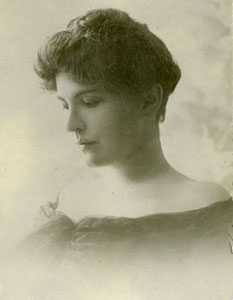 This Goodly Land
This Goodly Land
Mary McNeil Fenollosa (March 8, 1865–January 11, 1954)

Other Names Used
- Mary Elizabeth McNeill: birth name
- Mary McNeill Chester: married name, first husband
- Mary McNeill Scott: married name, second husband
- Mary McNeill Fenollosa: married name, third husband
- Sidney McCall: pen name
Alabama Connections
- Wilcox County: birthplace
- Mobile, Mobile County: childhood residence, adult residence
- Spring Hill, Mobile County: adult residence
- Montrose, Baldwin County: brief adult residence
Selected Works
- Fenollosa, Mary McNeil. Out of the Nest: A Flight of Verses. Boston: Little, Brown, and Company, 1899. An online version of Out of the Nest is available from Google Book Search.
- McCall, Sidney. Truth Dexter. Boston: Little, Brown, and Company, 1901. An online version of Truth Dexter is available from Google Book Search.
- McCall, Sidney. The Breath of the Gods. Boston: Little, Brown, and Company, 1905. An online version of The Breath of the Gods is available from Internet Archive's American Libraries.
- Fenollosa, Mary McNeil. The Dragon Painter. Boston: Little, Brown, and Company, 1906. An online version of The Dragon Painter is available from Google Book Search.
- McCall, Sidney. Red Horse Hill. Boston: Little, Brown, and Company, 1909. An online version of Red Horse Hill is available from Google Book Search.
- Fenollosa, Mary. Blossoms from a Japanese Garden: A Book of Child-Verses. New York: Frederick A. Stokes, 1913. An online version of Blossoms from a Japanese Garden is available from Google Book Search. For younger readers.
Biographical Information
Mary McNeill Fenollosa was born on her grandparents’ southern Alabama plantation after her family fled there from federal troops advancing on Mobile. She grew up in Mobile and was educated at the Irving Female Institute. Fenollosa’s family struggled financially during her childhood. In addition to her father’s various jobs as private secretary, botanist, and cartographer, both parents wrote for newspapers and magazines. Fenollosa began writing for publication when she became widowed at the age of 20 and returned home to live with her parents. She remarried in 1890 and moved to Japan where her husband was living. While there, Fenollosa studied the Japanese language and culture. After the failure of the marriage, she returned to Mobile in 1892 but retained her interest in Japan. She continued to write and was published in nationally distributed publications such as The Century, Lippincott’s, St. Nicholas, and Scribner’s. In 1894, Fenollosa moved to Boston to work at the Museum of Fine Arts as an assistant to Ernest Fenollosa, an expert in Oriental art. They married in 1895 and moved to Japan in 1897.
While there, Fenollosa published a collection of her poems under a variation of her real name (she dropped an “l” from her maiden name at her mother’s suggestion). Prompted by homesickness, she also wrote a novel based in Mobile, Truth Dexter, which she published under the pen name Sidney McCall. Fenollosa and her husband returned to the United States to be closer to her children who were attending U.S. schools. She was again moved by homesickness to write, this time a novel based in Japan. Another Japan-based novel was an expansion of the short story with which Fenollosa won a contest sponsored by Collier’s magazine. After her husband’s death in 1909, Fenollosa devoted herself to editing his life’s work, a collection of material on Oriental art. This work was published as Epochs of Chinese and Japanese Art. The project took three years to complete and drained her finances. Fenollosa was forced to sell her husband’s Oriental art collection and the Mobile property which she had purchased with the money from Truth Dexter. The project also drained her creativity. She wrote a few more novels, but they were unsuccessful. Fenollosa spent much of the rest of her life living with her children and did not return to Alabama until shortly before her death. Several of her novels were made into silent movies.
Interests and Themes
Mary McNeil Fenollosa’s novels and poetry reflect the lands and cultures she knew best, Alabama and Japan.
For More Information
Please check your local library for these materials. If items are not available locally, your librarian can help you borrow them through the InterLibrary Loan program. Your librarian can also help you find other information about this author.
There may be more information available through the databases in the Alabama Virtual Library. If you are an Alabama citizen, AVL can be used at your public library or school library media center. You can also get a username and password from your librarian to use AVL at home.
Reference Articles
- Delaney, Caldwell. "Mary McNeil Fenollosa, An Alabama Woman of Letters". Alabama Review 16.3. (1965): 163-173.
Reference Web Sites
- Hafner, John H. "Mary McNeil Fenollosa". The Encyclopedia of Alabama. 2009. Alabama Humanities Foundation and Auburn University. http://www.encyclopediaofalabama.org/face/Article.jsp?id=h-2346.
Location of Papers
- University of South Alabama
- University of Virginia
Photo from Mary McNeil Fenollosa: A Sketch of Her Life and Work, Floy Grimmett, 1939.
Last updated on Jul 23, 2009.